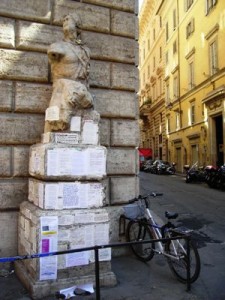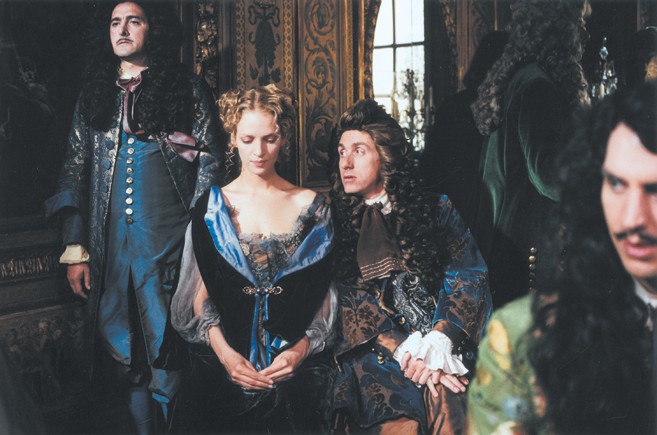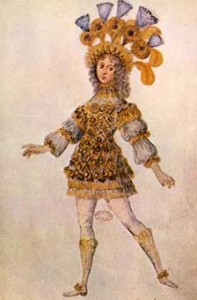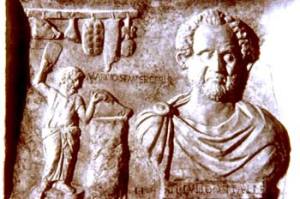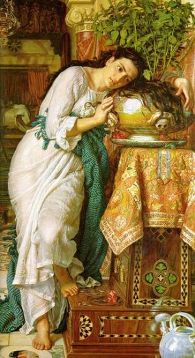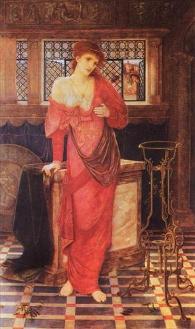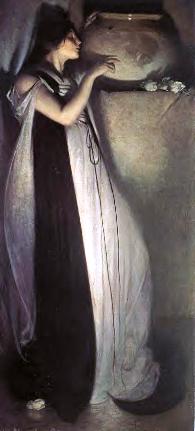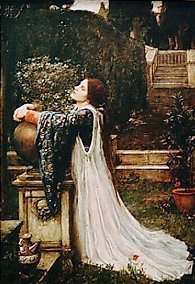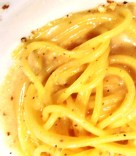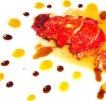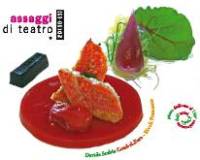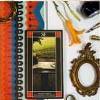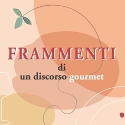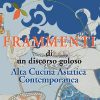Boccaccio, Decameron – Giornata quarta Novella quinta
Giovanni Boccaccio
Decameron
Giornata Quarta Novella quinta
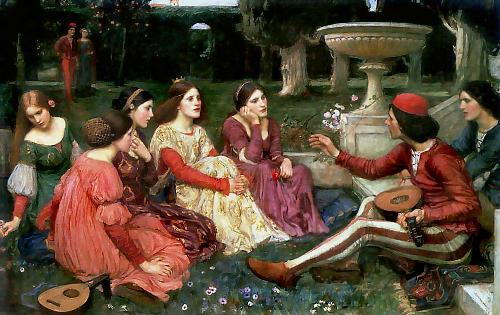 |
|
I fratelli dell’Isabetta uccidon l’amante di lei; egli l’apparisce in sogno e mostrale dove sia sotterrato. Ella occultamente disotterra la testa e mettela in un testo di bassilico; e quivi su piagnendo ogni dì per una grande ora, i fratelli gliele tolgono, ed ella se ne muore di dolore poco appresso. Finita la novella d’Elissa, e alquanto dal re commendata, a Filomena fu imposto che ragionasse; la quale, tutta piena di compassione del misero Gerbino e della sua donna, dopo un pietoso sospiro incominciò: Quale esso fu lo malo cristiano, |
John Keats, Isabel or The Pot of Basil
John Keats 1795–1821
“Isabella or, The Pot of Basil”
A Story from Boccaccio
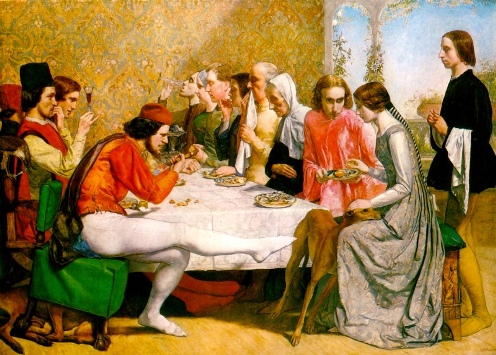 |
I.
FAIR Isabel, poor simple Isabel!
Lorenzo, a young palmer in Love’s eye!
They could not in the self-same mansion dwell
Without some stir of heart, some malady;
They could not sit at meals but feel how well 5
It soothed each to be the other by;
They could not, sure, beneath the same roof sleep
But to each other dream, and nightly weep.
II.
With every morn their love grew tenderer,
With every eve deeper and tenderer still; 10
He might not in house, field, or garden stir,
But her full shape would all his seeing fill;
And his continual voice was pleasanter
To her, than noise of trees or hidden rill;
Her lute-string gave an echo of his name, 15
She spoilt her half-done broidery with the same.
III.
He knew whose gentle hand was at the latch,
Before the door had given her to his eyes;
And from her chamber-window he would catch
Her beauty farther than the falcon spies; 20
And constant as her vespers would he watch,
Because her face was turn’d to the same skies;
And with sick longing all the night outwear,
To hear her morning-step upon the stair.
IV.
A whole long month of May in this sad plight 25
Made their cheeks paler by the break of June:
“To morrow will I bow to my delight,
“To-morrow will I ask my lady’s boon.”—
“O may I never see another night,
“Lorenzo, if thy lips breathe not love’s tune.”— 30
So spake they to their pillows; but, alas,
Honeyless days and days did he let pass;
V.
Until sweet Isabella’s untouch’d cheek
Fell sick within the rose’s just domain,
Fell thin as a young mother’s, who doth seek 35
By every lull to cool her infant’s pain:
“How ill she is,” said he, “I may not speak,
“And yet I will, and tell my love all plain:
“If looks speak love-laws, I will drink her tears,
“And at the least ’twill startle off her cares.” 40
VI.
So said he one fair morning, and all day
His heart beat awfully against his side;
And to his heart he inwardly did pray
For power to speak; but still the ruddy tide
Stifled his voice, and puls’d resolve away— 45
Fever’d his high conceit of such a bride,
Yet brought him to the meekness of a child:
Alas! when passion is both meek and wild!
VII.
So once more he had wak’d and anguished
A dreary night of love and misery, 50
If Isabel’s quick eye had not been wed
To every symbol on his forehead high;
She saw it waxing very pale and dead,
And straight all flush’d; so, lisped tenderly,
“Lorenzo!”—here she ceas’d her timid quest, 55
But in her tone and look he read the rest.
VIII.
“O Isabella, I can half perceive
“That I may speak my grief into thine ear;
“If thou didst ever any thing believe,
“Believe how I love thee, believe how near 60
“My soul is to its doom: I would not grieve
“Thy hand by unwelcome pressing, would not fear
“Thine eyes by gazing; but I cannot live
“Another night, and not my passion shrive.
IX.
“Love! thou art leading me from wintry cold, 65
“Lady! thou leadest me to summer clime,
“And I must taste the blossoms that unfold
“In its ripe warmth this gracious morning time.”
So said, his erewhile timid lips grew bold,
And poesied with hers in dewy rhyme: 70
Great bliss was with them, and great happiness
Grew, like a lusty flower in June’s caress.
X.
Parting they seem’d to tread upon the air,
Twin roses by the zephyr blown apart
Only to meet again more close, and share 75
The inward fragrance of each other’s heart.
She, to her chamber gone, a ditty fair
Sang, of delicious love and honey’d dart;
He with light steps went up a western hill,
And bade the sun farewell, and joy’d his fill. 80
XI.
All close they met again, before the dusk
Had taken from the stars its pleasant veil,
All close they met, all eves, before the dusk
Had taken from the stars its pleasant veil,
Close in a bower of hyacinth and musk, 85
Unknown of any, free from whispering tale.
Ah! better had it been for ever so,
Than idle ears should pleasure in their woe.
XII.
Were they unhappy then?—It cannot be—
Too many tears for lovers have been shed, 90
Too many sighs give we to them in fee,
Too much of pity after they are dead,
Too many doleful stories do we see,
Whose matter in bright gold were best be read;
Except in such a page where Theseus’ spouse 95
Over the pathless waves towards him bows.
XIII.
But, for the general award of love,
The little sweet doth kill much bitterness;
Though Dido silent is in under-grove,
And Isabella’s was a great distress, 100
Though young Lorenzo in warm Indian clove
Was not embalm’d, this truth is not the less—
Even bees, the little almsmen of spring-bowers,
Know there is richest juice in poison-flowers.
XIV.
With her two brothers this fair lady dwelt, 105
Enriched from ancestral merchandize,
And for them many a weary hand did swelt
In torched mines and noisy factories,
And many once proud-quiver’d loins did melt
In blood from stinging whip;—with hollow eyes 110
Many all day in dazzling river stood,
To take the rich-ored driftings of the flood.
XV.
For them the Ceylon diver held his breath,
And went all naked to the hungry shark;
For them his ears gush’d blood; for them in death 115
The seal on the cold ice with piteous bark
Lay full of darts; for them alone did seethe
A thousand men in troubles wide and dark:
Half-ignorant, they turn’d an easy wheel,
That set sharp racks at work, to pinch and peel. 120
XVI.
Why were they proud? Because their marble founts
Gush’d with more pride than do a wretch’s tears?—
Why were they proud? Because fair orange-mounts
Were of more soft ascent than lazar stairs?—
Why were they proud? Because red-lin’d accounts 125
Were richer than the songs of Grecian years?—
Why were they proud? again we ask aloud,
Why in the name of Glory were they proud?
XVII.
Yet were these Florentines as self-retired
In hungry pride and gainful cowardice, 130
As two close Hebrews in that land inspired,
Paled in and vineyarded from beggar-spies,
The hawks of ship-mast forests—the untired
And pannier’d mules for ducats and old lies—
Quick cat’s-paws on the generous stray-away,— 135
Great wits in Spanish, Tuscan, and Malay.
XVIII.
How was it these same ledger-men could spy
Fair Isabella in her downy nest?
How could they find out in Lorenzo’s eye
A straying from his toil? Hot Egypt’s pest 140
Into their vision covetous and sly!
How could these money-bags see east and west?—
Yet so they did—and every dealer fair
Must see behind, as doth the hunted hare.
XIX.
O eloquent and famed Boccaccio! 145
Of thee we now should ask forgiving boon,
And of thy spicy myrtles as they blow,
And of thy roses amorous of the moon,
And of thy lilies, that do paler grow
Now they can no more hear thy ghittern’s tune, 150
For venturing syllables that ill beseem
The quiet glooms of such a piteous theme.
XX.
Grant thou a pardon here, and then the tale
Shall move on soberly, as it is meet;
There is no other crime, no mad assail 155
To make old prose in modern rhyme more sweet:
But it is done—succeed the verse or fail—
To honour thee, and thy gone spirit greet;
To stead thee as a verse in English tongue,
An echo of thee in the north-wind sung. 160
XXI.
These brethren having found by many signs
What love Lorenzo for their sister had,
And how she lov’d him too, each unconfines
His bitter thoughts to other, well nigh mad
That he, the servant of their trade designs, 165
Should in their sister’s love be blithe and glad,
When ’twas their plan to coax her by degrees
To some high noble and his olive-trees.
XXII.
And many a jealous conference had they,
And many times they bit their lips alone, 170
Before they fix’d upon a surest way
To make the youngster for his crime atone;
And at the last, these men of cruel clay
Cut Mercy with a sharp knife to the bone;
For they resolved in some forest dim 175
To kill Lorenzo, and there bury him.
XXIII.
So on a pleasant morning, as he leant
Into the sun-rise, o’er the balustrade
Of the garden-terrace, towards him they bent
Their footing through the dews; and to him said, 180
“You seem there in the quiet of content,
“Lorenzo, and we are most loth to invade
“Calm speculation; but if you are wise,
“Bestride your steed while cold is in the skies.
XXIV.
“To-day we purpose, ay, this hour we mount 185
“To spur three leagues towards the Apennine;
“Come down, we pray thee, ere the hot sun count
“His dewy rosary on the eglantine.”
Lorenzo, courteously as he was wont,
Bow’d a fair greeting to these serpents’ whine; 190
And went in haste, to get in readiness,
With belt, and spur, and bracing huntsman’s dress.
XXV.
And as he to the court-yard pass’d along,
Each third step did he pause, and listen’d oft
If he could hear his lady’s matin-song, 195
Or the light whisper of her footstep soft;
And as he thus over his passion hung,
He heard a laugh full musical aloft;
When, looking up, he saw her features bright
Smile through an in-door lattice, all delight. 200
XXVI.
“Love, Isabel!” said he, “I was in pain
“Lest I should miss to bid thee a good morrow:
“Ah! what if I should lose thee, when so fain
“I am to stifle all the heavy sorrow
“Of a poor three hours’ absence? but we’ll gain 205
“Out of the amorous dark what day doth borrow.
“Good bye! I’ll soon be back.”—“Good bye!” said she:—
And as he went she chanted merrily.
XXVII.
So the two brothers and their murder’d man
Rode past fair Florence, to where Arno’s stream 210
Gurgles through straiten’d banks, and still doth fan
Itself with dancing bulrush, and the bream
Keeps head against the freshets. Sick and wan
The brothers’ faces in the ford did seem,
Lorenzo’s flush with love.—They pass’d the water 215
Into a forest quiet for the slaughter.
XXVIII.
There was Lorenzo slain and buried in,
There in that forest did his great love cease;
Ah! when a soul doth thus its freedom win,
It aches in loneliness—is ill at peace 220
As the break-covert blood-hounds of such sin:
They dipp’d their swords in the water, and did tease
Their horses homeward, with convulsed spur,
Each richer by his being a murderer.
XXIX.
They told their sister how, with sudden speed, 225
Lorenzo had ta’en ship for foreign lands,
Because of some great urgency and need
In their affairs, requiring trusty hands.
Poor Girl! put on thy stifling widow’s weed,
And ’scape at once from Hope’s accursed bands; 230
To-day thou wilt not see him, nor to-morrow,
And the next day will be a day of sorrow.
XXX.
She weeps alone for pleasures not to be;
Sorely she wept until the night came on,
And then, instead of love, O misery! 235
She brooded o’er the luxury alone:
His image in the dusk she seem’d to see,
And to the silence made a gentle moan,
Spreading her perfect arms upon the air,
And on her couch low murmuring, “Where? O where?” 240
XXXI.
But Selfishness, Love’s cousin, held not long
Its fiery vigil in her single breast;
She fretted for the golden hour, and hung
Upon the time with feverish unrest—
Not long—for soon into her heart a throng 245
Of higher occupants, a richer zest,
Came tragic; passion not to be subdued,
And sorrow for her love in travels rude.
XXXII.
In the mid days of autumn, on their eves
The breath of Winter comes from far away, 250
And the sick west continually bereaves
Of some gold tinge, and plays a roundelay
Of death among the bushes and the leaves,
To make all bare before he dares to stray
From his north cavern. So sweet Isabel 255
By gradual decay from beauty fell,
XXXIII.
Because Lorenzo came not. Oftentimes
She ask’d her brothers, with an eye all pale,
Striving to be itself, what dungeon climes
Could keep him off so long? They spake a tale 260
Time after time, to quiet her. Their crimes
Came on them, like a smoke from Hinnom’s vale;
And every night in dreams they groan’d aloud,
To see their sister in her snowy shroud.
XXXIV.
And she had died in drowsy ignorance, 265
But for a thing more deadly dark than all;
It came like a fierce potion, drunk by chance,
Which saves a sick man from the feather’d pall
For some few gasping moments; like a lance,
Waking an Indian from his cloudy hall 270
With cruel pierce, and bringing him again
Sense of the gnawing fire at heart and brain.
XXXV.
It was a vision.—In the drowsy gloom,
The dull of midnight, at her couch’s foot
Lorenzo stood, and wept: the forest tomb 275
Had marr’d his glossy hair which once could shoot
Lustre into the sun, and put cold doom
Upon his lips, and taken the soft lute
From his lorn voice, and past his loamed ears
Had made a miry channel for his tears. 280
XXXVI.
Strange sound it was, when the pale shadow spake;
For there was striving, in its piteous tongue,
To speak as when on earth it was awake,
And Isabella on its music hung:
Languor there was in it, and tremulous shake, 285
As in a palsied Druid’s harp unstrung;
And through it moan’d a ghostly under-song,
Like hoarse night-gusts sepulchral briars among.
XXXVII.
Its eyes, though wild, were still all dewy bright
With love, and kept all phantom fear aloof 290
From the poor girl by magic of their light,
The while it did unthread the horrid woof
Of the late darken’d time,—the murderous spite
Of pride and avarice,—the dark pine roof
In the forest,—and the sodden turfed dell, 295
Where, without any word, from stabs he fell.
XXXVIII.
Saying moreover, “Isabel, my sweet!
“Red whortle-berries droop above my head,
“And a large flint-stone weighs upon my feet;
“Around me beeches and high chestnuts shed 300
“Their leaves and prickly nuts; a sheep-fold bleat
“Comes from beyond the river to my bed:
“Go, shed one tear upon my heather-bloom,
“And it shall comfort me within the tomb.
XXXIX.
“I am a shadow now, alas! alas! 305
“Upon the skirts of human-nature dwelling
“Alone: I chant alone the holy mass,
“While little sounds of life are round me knelling,
“And glossy bees at noon do fieldward pass,
“And many a chapel bell the hour is telling, 310
“Paining me through: those sounds grow strange to me,
“And thou art distant in Humanity.
XL.
“I know what was, I feel full well what is,
“And I should rage, if spirits could go mad;
“Though I forget the taste of earthly bliss, 315
“That paleness warms my grave, as though I had
“A Seraph chosen from the bright abyss
“To be my spouse: thy paleness makes me glad;
“Thy beauty grows upon me, and I feel
“A greater love through all my essence steal.” 320
XLI.
The Spirit mourn’d “Adieu!”—dissolv’d, and left
The atom darkness in a slow turmoil;
As when of healthful midnight sleep bereft,
Thinking on rugged hours and fruitless toil,
We put our eyes into a pillowy cleft, 325
And see the spangly gloom froth up and boil:
It made sad Isabella’s eyelids ache,
And in the dawn she started up awake;
XLII.
“Ha! ha!” said she, “I knew not this hard life,
“I thought the worst was simple misery; 330
“I thought some Fate with pleasure or with strife
“Portion’d us—happy days, or else to die;
“But there is crime—a brother’s bloody knife!
“Sweet Spirit, thou hast school’d my infancy:
“I’ll visit thee for this, and kiss thine eyes, 335
“And greet thee morn and even in the skies.”
XLIII.
When the full morning came, she had devised
How she might secret to the forest hie;
How she might find the clay, so dearly prized,
And sing to it one latest lullaby; 340
How her short absence might be unsurmised,
While she the inmost of the dream would try.
Resolv’d, she took with her an aged nurse,
And went into that dismal forest-hearse.
XLIV.
See, as they creep along the river side, 345
How she doth whisper to that aged Dame,
And, after looking round the champaign wide,
Shows her a knife.—“What feverous hectic flame
“Burns in thee, child?—What good can thee betide,
“That thou should’st smile again?”—The evening came, 350
And they had found Lorenzo’s earthy bed;
The flint was there, the berries at his head.
XLV.
Who hath not loiter’d in a green church-yard,
And let his spirit, like a demon-mole,
Work through the clayey soil and gravel hard, 355
To see skull, coffin’d bones, and funeral stole;
Pitying each form that hungry Death hath marr’d,
And filling it once more with human soul?
Ah! this is holiday to what was felt
When Isabella by Lorenzo knelt. 360
XLVI.
She gaz’d into the fresh-thrown mould, as though
One glance did fully all its secrets tell;
Clearly she saw, as other eyes would know
Pale limbs at bottom of a crystal well;
Upon the murderous spot she seem’d to grow, 365
Like to a native lily of the dell:
Then with her knife, all sudden, she began
To dig more fervently than misers can.
XLVII.
Soon she turn’d up a soiled glove, whereon
Her silk had play’d in purple phantasies, 370
She kiss’d it with a lip more chill than stone,
And put it in her bosom, where it dries
And freezes utterly unto the bone
Those dainties made to still an infant’s cries:
Then ’gan she work again; nor stay’d her care, 375
But to throw back at times her veiling hair.
XLVIII.
That old nurse stood beside her wondering,
Until her heart felt pity to the core
At sight of such a dismal labouring,
And so she kneeled, with her locks all hoar, 380
And put her lean hands to the horrid thing:
Three hours they labour’d at this travail sore;
At last they felt the kernel of the grave,
And Isabella did not stamp and rave.
XLIX.
Ah! wherefore all this wormy circumstance? 385
Why linger at the yawning tomb so long?
O for the gentleness of old Romance,
The simple plaining of a minstrel’s song!
Fair reader, at the old tale take a glance,
For here, in truth, it doth not well belong 390
To speak:—O turn thee to the very tale,
And taste the music of that vision pale.
L.
With duller steel than the Persèan sword
They cut away no formless monster’s head,
But one, whose gentleness did well accord 395
With death, as life. The ancient harps have said,
Love never dies, but lives, immortal Lord:
If Love impersonate was ever dead,
Pale Isabella kiss’d it, and low moan’d.
’Twas love; cold,—dead indeed, but not dethroned. 400
LI.
In anxious secrecy they took it home,
And then the prize was all for Isabel:
She calm’d its wild hair with a golden comb,
And all around each eye’s sepulchral cell
Pointed each fringed lash; the smeared loam 405
With tears, as chilly as a dripping well,
She drench’d away:—and still she comb’d, and kept
Sighing all day—and still she kiss’d, and wept.
LII.
Then in a silken scarf,—sweet with the dews
Of precious flowers pluck’d in Araby, 410
And divine liquids come with odorous ooze
Through the cold serpent pipe refreshfully,—
She wrapp’d it up; and for its tomb did choose
A garden-pot, wherein she laid it by,
And cover’d it with mould, and o’er it set 415
Sweet Basil, which her tears kept ever wet.
LIII.
And she forgot the stars, the moon, and sun,
And she forgot the blue above the trees,
And she forgot the dells where waters run,
And she forgot the chilly autumn breeze; 420
She had no knowledge when the day was done,
And the new morn she saw not: but in peace
Hung over her sweet Basil evermore,
And moisten’d it with tears unto the core.
LIV.
And so she ever fed it with thin tears, 425
Whence thick, and green, and beautiful it grew,
So that it smelt more balmy than its peers
Of Basil-tufts in Florence; for it drew
Nurture besides, and life, from human fears,
From the fast mouldering head there shut from view: 430
So that the jewel, safely casketed,
Came forth, and in perfumed leafits spread.
LV.
O Melancholy, linger here awhile!
O Music, Music, breathe despondingly!
O Echo, Echo, from some sombre isle, 435
Unknown, Lethean, sigh to us—O sigh!
Spirits in grief, lift up your heads, and smile;
Lift up your heads, sweet Spirits, heavily,
And make a pale light in your cypress glooms,
Tinting with silver wan your marble tombs. 440
LVI.
Moan hither, all ye syllables of woe,
From the deep throat of sad Melpomene!
Through bronzed lyre in tragic order go,
And touch the strings into a mystery;
Sound mournfully upon the winds and low; 445
For simple Isabel is soon to be
Among the dead: She withers, like a palm
Cut by an Indian for its juicy balm.
LVII.
O leave the palm to wither by itself;
Let not quick Winter chill its dying hour!— 450
It may not be—those Baalites of pelf,
Her brethren, noted the continual shower
From her dead eyes; and many a curious elf,
Among her kindred, wonder’d that such dower
Of youth and beauty should be thrown aside 455
By one mark’d out to be a Noble’s bride.
LVIII.
And, furthermore, her brethren wonder’d much
Why she sat drooping by the Basil green,
And why it flourish’d, as by magic touch;
Greatly they wonder’d what the thing might mean: 460
They could not surely give belief, that such
A very nothing would have power to wean
Her from her own fair youth, and pleasures gay,
And even remembrance of her love’s delay.
LIX.
Therefore they watch’d a time when they might sift 465
This hidden whim; and long they watch’d in vain;
For seldom did she go to chapel-shrift,
And seldom felt she any hunger-pain;
And when she left, she hurried back, as swift
As bird on wing to breast its eggs again; 470
And, patient as a hen-bird, sat her there
Beside her Basil, weeping through her hair.
LX.
Yet they contriv’d to steal the Basil-pot,
And to examine it in secret place:
The thing was vile with green and livid spot, 475
And yet they knew it was Lorenzo’s face:
The guerdon of their murder they had got,
And so left Florence in a moment’s space,
Never to turn again.—Away they went,
With blood upon their heads, to banishment. 480
LXI.
O Melancholy, turn thine eyes away!
O Music, Music, breathe despondingly!
O Echo, Echo, on some other day,
From isles Lethean, sigh to us—O sigh!
Spirits of grief, sing not your “Well-a-way!” 485
For Isabel, sweet Isabel, will die;
Will die a death too lone and incomplete,
Now they have ta’en away her Basil sweet.
LXII.
Piteous she look’d on dead and senseless things,
Asking for her lost Basil amorously: 490
And with melodious chuckle in the strings
Of her lorn voice, she oftentimes would cry
After the Pilgrim in his wanderings,
To ask him where her Basil was; and why
’Twas hid from her: “For cruel ’tis,” said she, 495
“To steal my Basil-pot away from me.”
LXIII.
And so she pined, and so she died forlorn,
Imploring for her Basil to the last.
No heart was there in Florence but did mourn
In pity of her love, so overcast. 500
And a sad ditty of this story born
From mouth to mouth through all the country pass’d:
Still is the burthen sung—“O cruelty,
“To steal my Basil-pot away from me!”
Storie gourmet – Dialetto romanesco
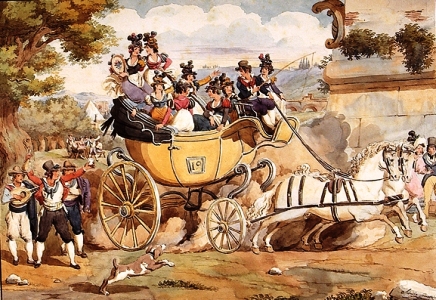 |
|
Definito da Dante “turpiloquio”, il dialetto romano non è forse fra i più eleganti, ma risulta assai simpatico e comprensibile. Chi voglia apprenderne i primi rudimenti, può iniziare a bazzicà le bettole più accaciarate, rimbambendosi con le chiacchiere degli avventori, ordinando ‘na bruschetta e ‘na savonea al cameriere acchittato in battichiappe per azzuppà il palato, guardando l’oste scavolà un vino abbocatello, lasciando una piotta di mancia senza alluccà e poi sbioccandosi con i sonetti del poeta Giuseppe Gioacchino Belli, gustosi ritratti della città e dei suoi abitanti. |
|
Mo ssenti er pranzo mio. Ris’e piselli, Poi fritto de carciofoli e ggranelli, Ce funno peperoni sott’aceto, Eppoi risorio der perfett’amore, Bbè, cche importò er trattore? Belli, Er pranzo de le minente (*) (*) I minenti erano coloro che vestivano l’abito proprio del volgo romanesco |
| Foto grande in alto: Achille Pinelli, Carrettella delle Ottobrate romane |
Storie gourmet – Vino in mescita ai cancelletti
|
|
|
|
|
Ma cchi ddiavolo, cristo!, l’ha ttentato La sera, armanco, doppo avé ssudato, Ne pò penzà de ppiú sto Santopadre, Cqui nun ze fa ppe mmormorà, ffratello: Fu Pio VIII, successore di Leone XII, Allor che il sommo Pio |
|
locali gourmet vicino alla statua parlante di Pasquino: |
Storie gourmet – Il pollice verde del Re Sole e l’Orto botanico di Roma
|
|
|
Si legge nel diario della marchesa di Sévigné che Il maestro di cerimonia francese del XVII secolo François Vatel si suicidò per il ritardo nella consegna del pesce fresco destinato al banchetto offerto nel Castello di Chantilly dal Principe di Condé al Re Sole per riconquistarne i favori. Sentendosi disonorato per aver fallito il suo compito, Vatel si trapassava il petto con la spada cadendo a terra privo di vita, proprio mentre cominciavano ad arrivare cesti di pesce in abbondanza. Ciò non gli impedì di passare comunque alla storia come inventore della crema Chantilly, una nivea prelibatezza a base di panna montata e zucchero, impiegata in pasticceria per farcire i dolci. |
|
Vatel mostra al Principe di Condè il modellino della statua del Tritone da realizzare in ghiaccio per il banchetto offerto in onore del Re Sole |
|
L’illuminismo è alle porte, ma la gotta si cura ancora col cuore palpitante dei volatili e un’eterea e non ancora sanguinaria Uma Thurman incespica nei drappeggi secenteschi e nei veleni di corte. Nel film Luigi XIV pare interessato unicamente ai “piaceri della carne” e invece a Versailles proprio intorno al 1670 importanti opere di bonifica e sistemazioni di terreni portavano alla nascita di un moderno modello agricolo. Jean Baptiste de la Quintinie veniva nominato “Directeur des jardins fruitiers et potagers des maisons royales” e introduceva ogni specie vegetale commestibile nelle serre, dove il Re Sole trascorreva molto del suo tempo, senza disdegnare i lavori manuali. |
|
|
|
Roma aveva già dal 1278 un ben organizzato Hortus Simplicium e deteneva un primato nella storia della Botanica, grazie all’istituzione nel 1513 presso l’Università della prima cattedra di Botanica (Lectura simplicium Ad declarationem simplicium medicinae). Nel 1660 nasceva l’Orto Botanico Universitario mentre l’attuale Orto Botanico di Roma fu istituito nel 1883 grazie a una donazione di 12 ettari di terreno da parte del principe Tommaso Corsini. Qui i visitatori possono osservare, dalla collina del Gianicolo alle sponde del Tevere, numerose specie vegetali collocate nelle loro aree di origine. La scrittrice Elena Stancanelli lamenta l’assenza delle scritte in latino vicino alle radici delle piante “che poi ci sarebbero, ma sono tutte sbrodolate dalla pioggia o divelte o messe in qualche punto talmente eccentrico che è impossibile associare significato e significante”. Si attende anche l’arrivo dell’oasi bar e del negozio di souvenir con servizi da tè dai botanici decori, libri di giardinaggio e semini da piantare per emulare il Re Sole.
|
|
Orto Botanico di Roma Ingresso |
Storie gourmet – Sotto il segno del maiale
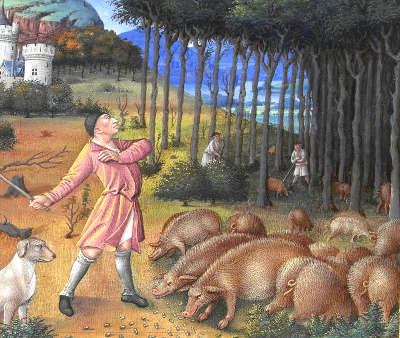 |
|
Il maiale ha un legame con le società umane che si dipana in una storia millenaria. Era un animale sacro già a Maia e proprio a questa divinità ispira probabilmente il suo nome, che letteralmente significa “animale vivente”. |
|
Monumento funerario della moglie Ebria del macellaio |
|
I Romani furono sin dalle origini grandi mangiatori di carni suine. Basti pensare che a Roma, fra III e il VI secolo, nel Forum suarium che serviva anche per la vendita libera, nei mesi invernali avvenivano distribuzioni gratuite di caro porcina (circa otto chili a beneficiario) esatta come imposta dalle province meridionali e dalla Sardegna. I commercianti di maiali, i suarii, operavano inoltre in tutte le province della Penisola e il lardo (non l’olio) era il condimento principe dei legumi cotti, dei quali i Romani facevano ampio uso. |
|
Mastro salatore nella sua bottega di lardarolo. |
|
Molto diffuso era il porcellino (porcellus lactans) e comunissima era la coscia intera di suino, sempre presente nelle raffigurazioni di macelleria (anche in un affresco della Domus Aurea di Nerone), che veniva cotta in vari modi o salata e affumicata per conservarsi a lungo. In questo caso si chiamava perna, mentre un altro prosciutto più dolce ma di minor durata si chiamava petaso. L’agronomo Columella (L’agricoltura 12,55) prescrive una salagione della coscia che non differisce molto da quella odierna e prevede trattamento con sale medio, pressatura, strofinature ripetute con sale fino, lavaggio, affumicatura e stagionatura. |
| Foto grande in alto: Les très riches heures du Duc De Berry – Novembre |
Storie gourmet – Il basilico di Isabella
|
Il basilico viene importato in Europa da Alessandro Magno intorno al IV secolo a.C., di ritorno da una campagna in Asia, nei pressi dell’India. Insieme alla pianta arriva la leggenda di una ragazza di nome Vrinda. Una storia complessa, popolata di gelose divinità, demoni e angeli e alla fine della quale ci scappa il morto: lo sposo di Vrinda. La ragazza ne è talmente sconvolta da perdere il senno e compiere l’insano gesto di lasciarsi bruciare viva sulla pira dello sposo. Per tramandare la memoria della devozione della fanciulla, gli dei degli indù trasformano i suoi lunghi capelli bruciati in una pianta dal profumo soave chiamata tulsi, o basilico e ordinano ai sacerdoti di venerarla. Ancora oggi in alcuni tribunali indiani i testimoni prestano giuramento su un ciuffo di basilico, milioni di devoti iniziano la giornata in preghiera intorno alla tulsi e la sera le accendono un sacro lumino. In Europa la storia di Vrinda, un po’ come la piantina del basilico, subisce molte mutazioni divenendo più morbosa. Il nome della ragazza muta in Lisabetta che, non sopportando l’idea di separarsi dal corpo dell’amato ormai morto, ne taglia la testa e la seppellisce in un vaso di basilico. Lisabetta innaffia il basilico con le sue lacrime sino a morire di crepacuore e grazie allo specialissimo nutrimento, la pianta diviene talmente grande e rigogliosa, che la gente va in pellegrinaggio a visitarla. La storia di Lisabetta ha ispirato numerosi scrittori, poeti e pittori. Tutti hanno esaltato il legame tra il basilico e la follia, tanto che gli europei cambiarono il nome originario di tulsi in basilicum, in onore del basilisco, l’animale mitico che si riteneva crescesse nel cervello di coloro che annusavano la pianta. Nel Decameron di Boccaccio la storia di Isabella compare nella Giornata quarta, Novella quinta. La storia narra di tre giovani mercanti e della bellissima sorella Isabella che vivono a Messina. La ragazza è innamorata, corrisposta, dal garzone di bottega Lorenzo e i due si incontrano segretamente. Quando i fratelli di Isabella lo scoprono, decidono di uccidere il garzone perchè vogliono che la sorella sposi un ricco mercante. Invitano Lorenzo a una scampagnata fuori città, lo uccidono e ne seppelliscono il corpo. Poi raccontano di averlo mandato in viaggio per lavoro, ma, non vedendolo tornare, Isabella si dispera, finchè una notte Lorenzo le compare in sogno e le rivela di essere stato ucciso. La mattina Isabella si reca nel luogo indicato dal fantasma e scavando trova il corpo; ma poichè è troppo pesante da trasportare, ne taglia la testa e la nasconde in un grosso vaso di basilico. Non si separa più dal vaso, lo guarda con amore e lo innaffia con le sue lacrime tanto che la pianta cresce e diviene sempre più bella e profumata. Lo strano attaccamento di Isabella al vaso è interpretato dai fratelli come follia. Glielo sottraggono, vi scoprono la testa e, temendo che il loro delitto venga smascherato, la seppelliscono fuggendosene a Napoli. Isabella, lasciata sola e senza neppure il vaso di basilico da amare, “piagnendo si morì, e così il suo disaventurato amore ebbe terine. Ma poi a certo tempo divenuta questa cosa manifesta a molti, fu alcun che compuose quella canzone la quale ancora oggi si canta, cioè: Qual esso fu malo cristiano, che mi furò la grasta…” [ leggi la Novella ]
Il poeta inglese John Keats nel 1816 scrive il poema “Isabella or the Pot of Basil” dove sottolinea come la forza incontenibile dell’amore possa provocare eventi terribili: “Indi cresceva folta, e verde e bella Il poema di Keats a sua volta ispirò le opere di pittori Preraffaelliti quali Holman Hunt, John William Waterhouse, John Withe Alexander, John Melhuish Strudwick. |
|
Il basilico ispira anche alcune ricette create dagli Chef per Roma gourmet, come i Paccheri con scorfano, pomodoro e basilico di Giulio Terrinoni del ristorante Acquolina |
Ricette degli chef – pasta
Ravioli di pecorino e trippa alla Romana
ricetta dello Chef Antonello Colonna per il ristorante Open Colonna – Roma

















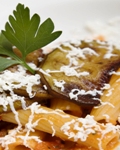

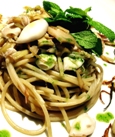
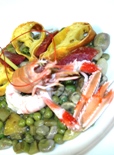
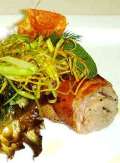


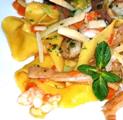









 Nel 1824 Artaud de Montor, biografo e contemporaneo di Leone XII, riporta la notizia di una bizzarra decisione presa dal papa: “a fine di preparare buoni esempi, o diciam piuttosto per allontanare i cattivi esempi, erasi ordinato che venissero chiuse tutte le bettole, nelle quali il vino bevuto in troppa grande abbondanza cagionava frequentemente scene funeste”. Il papa aveva cioè fatto apporre alle porte delle bettole un cancelletto, attraverso il quale si distribuiva il vino e si impediva alle persone di entrare a bere. La speranza era che tornassero a casa.
Nel 1824 Artaud de Montor, biografo e contemporaneo di Leone XII, riporta la notizia di una bizzarra decisione presa dal papa: “a fine di preparare buoni esempi, o diciam piuttosto per allontanare i cattivi esempi, erasi ordinato che venissero chiuse tutte le bettole, nelle quali il vino bevuto in troppa grande abbondanza cagionava frequentemente scene funeste”. Il papa aveva cioè fatto apporre alle porte delle bettole un cancelletto, attraverso il quale si distribuiva il vino e si impediva alle persone di entrare a bere. La speranza era che tornassero a casa. 